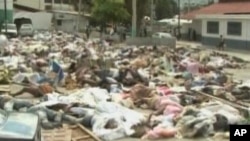Soon after the earthquake struck, and the search for the living had begun in Haiti, there were bodies, thousands and thousands of dead bodies. Then the burials began, not ordinary burials with traditional rituals and grief, but burials in mass graves.
The bodies were everywhere in Port-au-Prince, along streets, in collapsed buildings, everywhere where ordinary people might have been when the earthquake struck. Something had to be done.
So Haitian authorities simply asked people to put their dead out in the open, where they could be picked up - some 75,000 bodies - destined for mass graves. And many more yet to be buried. Officials estimate more than 100,000 more.
The International Committee of the Red Cross is among those groups and organizations that object to the mass burials. They contend the dead should be treated with greater dignity. Red Cross spokesman Bernard Barrett. "What's important is, whatever is done, must be done in a way that bodies will be eventually identified so that the families will know what happened to these people and they will not be left in uncertainty forever," he said.
But the burials in mass graves began admidst the chaos in Port-au-Prince, before any system could be set in motion to identify the dead. And that has compounded Haiti's tragedy, says Dr. Jon Andrus, deputy director of Pan American Health Organization, or PAHO. "Many, many families do not know where a missing family member is dead or alive - if dead, where they are. This really affects the grieving process. This has enormous implication on the well being and future status of people on the ground," he said.
Dr. Jon Andrus says his organization made every effort to prevent the mass burial of bodies. The World Health Organization agrees that the management of dead has profound and long-lasting consequences for survivors and communities, and its guidelines say the most urgent task is not burying the dead after a natural disaster.
The Red Cross's Bernard Barrett discounts the popular belief that the presence of large numbers of dead bodies after a natural disaster can cause an epidemic. "This is one message that we are trying to get across that there should not be an inordinate rush to dispose off the bodies through mass graves or incineration so that families will never know what happened to these people," he said.
But Dr. Andrus from of Pan American Health Organization says the sheer magnitude of the disaster in Haiti, made the situation impossible to manage. There were just too many dead people. "We know that bodies have been buried. We feel inappropriately, even when they have been identified and transported, when they can be, to a central location of United Nations (Logistics) Command. We are finding difficulties now adequately storing them," he said.
Officials estimate Haiti's death toll could climb to some 200,000 people, and that the 7.0 quake affected nearly a third of Haiti's entire population of nine million peole. About 1.5 million people are homeless, and Haitian government officials say an estimated 400,000 displaced residents will be moved to new villages outside Port-au-Prince.
Haiti Buries Thousands of Its Dead in Mass Graves




